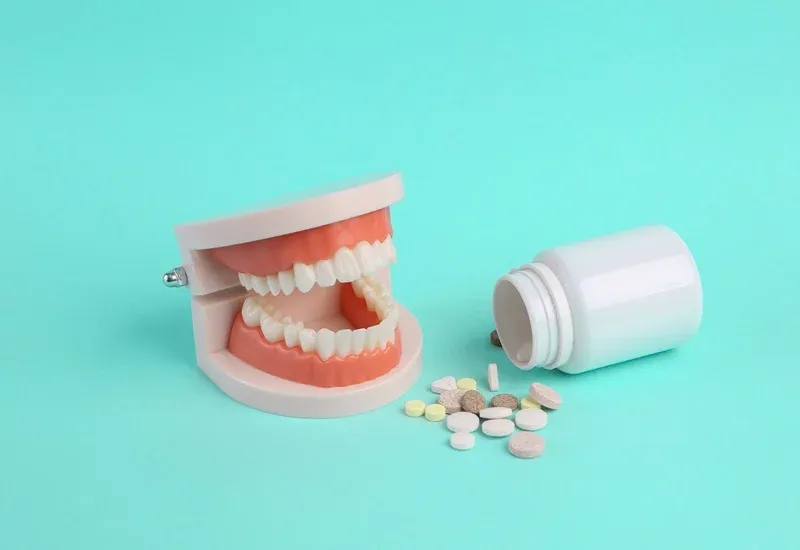Cosmetic Dentistry
10 Simple Ways to Relieve Painful Gums

by Dr. Kang
19 December 2024

When your gums hurt, it is a mixture of pain and confusion, and there can be many reasons for it. Perhaps you have been brushing your teeth too hard without realizing it. Maybe you have tried a new food that is harsh on your mouth, or there is a piece of food stuck between your teeth that is inflaming your gums. You could even have an early sign of gum disease, so it is especially important to take steps to relieve painful gums.
Whether it is caused by brushing too hard, trying new foods, or simply not paying enough attention to your oral health, gum pain can slow you down in your daily life. Luckily, there are simple, effective steps you can take at home to ease the discomfort. We will be exploring ten easy and affordable ways to help bring relief to your tender gums.

Apply a Cold Compress
When your gums are sore, applying something cold can help relieve painful gums. Think about what you do if you hurt your knee; you might put some ice on it to calm the inflammation. Your gums can benefit from the same idea. Wrap a small ice pack or a bag of frozen peas in a clean cloth and gently hold it against the outside of your cheek near the sore area.
The cold temperature helps slow down blood flow to the region, which can reduce swelling and lessen discomfort. Do not hold the cold pack directly on your gums inside your mouth, as that might be too intense and even cause more irritation. Keep it on your cheek for short periods, about 10 to 15 minutes at a time, giving your gums a break before applying it again.
Rinse with Warm Salt Water
Rinsing your mouth with warm salt water can soothe sore gums. Salt has natural cleansing properties that help reduce swelling and kill some of the bacteria living in your mouth. To make this solution, stir about half a teaspoon of salt into a glass of warm water until it dissolves. Then, swish the mixture around in your mouth for about 30 seconds before spitting it out. You can do this a couple of times a day.
It will not hurt you if you accidentally swallow the salt water, but it certainly will not taste very pleasant. Over time, this simple rinse can help soothe irritated gum tissue and make your mouth feel fresher.
Practice Gentle Brushing
One of the most common reasons for gum pain is brushing too hard. While it is important to keep your teeth clean, scrubbing your gums aggressively is not the answer. In fact, brushing roughly can wear down your gum tissue, making it more likely to feel sore or even bleed.
Start by choosing a toothbrush with soft bristles, which will be gentler to your gums. Move the brush gently in small, circular motions, trying to clean the spaces where your teeth and gums meet without pressing too hard.
If you are not sure how gentle you are, pay attention to how your mouth feels afterwards. Your gums should not feel irritated. By making gentle brushing a habit, you will help protect your gums and keep them healthier in the long run.

Use Pain Relievers
If the pain from your gums is distracting you from your day, it might be time to consider using an over-the-counter pain reliever. Medicines can help dull the ache and reduce swelling.
Always follow the instructions on the package, and keep in mind that these medications are meant for short-term relief. Pain relievers will not cure the cause of your sore gums, but they can help you feel better while you try other methods
Try Aloe Vera Gel
Aloe vera has natural healing qualities that help calm irritated skin. You can find aloe vera gel that is specifically made to be used in the mouth. Make sure it is a product approved for oral use, as not all aloe products are safe to swallow. When you apply a small amount of aloe vera gel to your gums, it can help reduce redness, swelling, and discomfort.
It may also help fight germs in your mouth, keeping the area cleaner as it heals. Give it a try a couple of times a day and pay attention to how your gums feel. If it feels soothing and your gums seem to be improving, aloe vera gel might become one of your go-to remedies.
Massage Your Gums
Just like a massage can relax sore muscles in your shoulders or neck, a gentle gum massage can help ease tension in your mouth. Using a clean finger or a soft toothbrush, gently rub your gums in a circular motion.
This action can help increase blood flow to the area, which encourages healing. If your gums are extremely sore, start very lightly first. The idea is to provide comforting, gentle pressure, not to add more pain.
Use a Medicated Mouthwash
A medicated mouthwash made for gum health can help reduce bacteria and prevent plaque from building up along your gum line. These mouthwashes often contain ingredients that fight germs and calm inflammation. Be sure to follow the instructions on the label; some are meant to be used once or twice a day, while others might have special directions.
Also, try not to overuse these products, since too much mouthwash might dry out your mouth and lead to other issues.
Stay Hydrated
When your mouth is dry, it is easier for bacteria to grow, which can cause more irritation and inflammation. Drinking water throughout the day helps wash away bits of food that get stuck between teeth and gums.
Water also supports the natural saliva flow in your mouth, which has its own germ-fighting properties. Aim for about eight glasses of water a day, or more if you are active or live in a hot climate.
See Your Dentist
If you have tried several of the steps above and your gums still hurt, it might be time to seek professional help. A dentist can examine your mouth and figure out what is causing the pain. Maybe it is a cavity that is bothering your gums, or perhaps you have early signs of gum disease.
Sometimes, even a piece of stuck food that you cannot see could cause big problems. Your dentist can also recommend specific treatments, such as a special toothpaste, a more powerful mouthwash, or even a procedure to clean and protect your gums.
Avoid Irritating Foods
Foods that are crunchy, spicy, or acidic can irritate sore gums and make them worse. For example, chips with sharp edges can poke at your gums and tangy citrus fruits can sting if your gum tissue is already tender. Sugary treats can also feed the bacteria in your mouth, which will lead to more inflammation. Instead, try to choose softer, bland foods that will not aggravate the area anymore.
Cooked vegetables, oatmeal, yogurt, and mashed potatoes can all be better choices while your gums heal. It does not mean you have to give up tasty meals entirely; just pick options that soothe rather than stress your gums. After a few days of eating softer foods, you might notice your gum pain calming down.
Conclusion
Gum pain can be quite scary, especially when you do not know what is causing it. But there are many steps you can take at home to help ease this discomfort. Taking care of your gums might not seem very exciting, but it is a key part of having a healthy mouth.
Strong and pain-free gums make it easier to eat, talk, laugh, and smile with confidence. It is worth the effort to find the right mix of supportive habits that keep your gums comfortable.
Contact your Dentist today, Dr Kang at Redwood Dental Napa, to learn more about ways to relieve painful gums.
Resource:
Share This:
Disclaimer
*This media/content or any other on this website does not prescribe, recommend, or prevent any treatment or procedure. Therefore, we highly recommend that you get the advice of a qualified dentist or other medical practitioners regarding your specific dental condition. *

